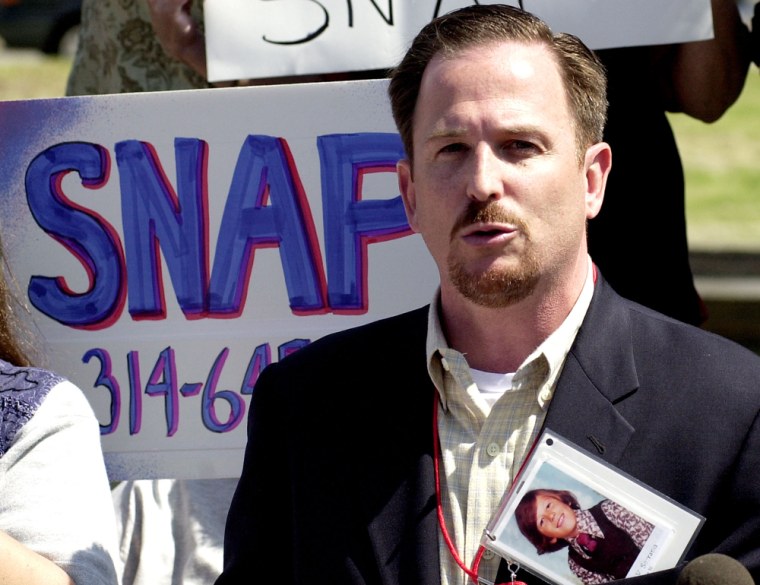Among the crowd cheering Pope John Paul II at Shea Stadium in 1979 was a 15-year-old New Jersey boy named Mark Serrano — there courtesy of a ticket provided by the priest he later accused of sexually molesting him.
Like other advocates for victims of abuse by priests, Serrano has mixed emotions as he assesses the papal transition now unfolding in the Roman Catholic Church. Though never losing affection for John Paul II, Serrano feels the Vatican under his leadership responded too weakly to the U.S. sex abuse scandal — and may not do any better under the next pope.
“Can we say the pope failed us? I think John Paul could have done more,” Serrano said. “Can we say the bureaucrats in Rome failed us? Absolutely.”
Serrano, who now lives in Leesburg, Va., is a regional official of SNAP — Survivors Network of those Abused by Priests.
SNAP’s national director, David Clohessy, and president, Barbara Blaine, said the pope’s rhetoric was admirable when he summoned America’s cardinals to the Vatican in 2002 and told them there was “no place in the priesthood” for those who harm children.
Blame put on U.S. bishops
“It’s been disappointing that the people who were close to the pope didn’t take his message to heart, and didn’t go further,” Blaine said. “We know full well that many bishops, even after that statement, left child molesters in the ministry.”
The pope’s comments, Clohessy said, “were good words that haven’t, unfortunately, been followed by real action. ... He was not well-served by his advisers.”
However, Clohessy added, the U.S. bishops deserve more blame that the Vatican.
“The bishops played legal hardball, were deceptive, transferred abusers and ignored victims,” Clohessy said. “They’re the front-line managers and have to bear responsibility.”
The abuse crisis erupted in Massachusetts in January 2002, then rippled into most dioceses in the United States; the church in Canada, Australia, Latin America and Europe — including the pope’s own Poland — also faced scandals.
Aside from the papal meeting with the U.S. cardinals, the Vatican tended to leave the scandal in the hands of American church leaders, although it did amend a proposed U.S. bishops’ discipline policy in 2002 to ensure that accused priests’ rights were respected.
“Since then the Holy See has not intervened,” said Helen Alvare, law professor at Catholic University in Washington D.C. “Might some future pope wish to speak more about the issue? It’s not impossible. There could be a shift of attention, a different way of speaking about things.”
Pope given 'selective information'
Anne Burke, an Illinois appellate judge, met with officials at the Vatican in December 2003 and January 2004 as part of her duties with the National Review Board, a lay panel appointed as a watchdog by U.S. bishops in response to the scandal.
“We found out there were some things they were not being told from this side of the pond,” Burke told The Associated Press. “We assumed that selective information was being given to Rome.”
She expressed hope that John Paul’s successor might take a more active role in addressing the abuse problem.
“A new pope could make a big difference, getting even more intimately involved, because we still see resistance by some U.S. bishops” to aggressive auditing of abuse cases in their dioceses, she said.
“On the other hand,” Burke said, “there could be more of a retreat and less involvement by Rome, which would only permit the American cardinals and bishops to fall away from their resolve. That would be a terrible step backward.”
Sue Archibald, who was abused by a Catholic chaplain while an Air Force Academy cadet and now heads a victim advocacy group called The Linkup, said the scandal had ignited activism among American parishioners that would intensify no matter which direction the new pope takes.
'Precious opportunity' missed
“If next pope is more conservative, that would increase the level of grass-roots activity of those wanting a more open, compassionate and accountable church,” she said. “If we saw a new pope who came in and offering to talk about these issues openly, we’d see the laity willing to say, ’This is fantastic; We’ll jump on board 110 percent.”’
As for John Paul’s papacy, Archibald said, “There’s disappointment in what could have been.”
“Pope John Paul II missed a precious opportunity to lead the world in addressing sexual abuse and providing compassionate response to those who have been harmed,” she said. “Perhaps the issue was too close to home, or perhaps the pope lacked the strength for the task in his later years. “
Serrano, now 42, was among the first U.S. Catholics to break confidentiality agreements with the church and publicly accuse priests of sexually abusing them. He got a $350,000 settlement from the Diocese of Paterson, N.J., in 1987, and later said a priest molested him from 1974 to 1981, when he was between the ages of 9 and 16.
“I was watching the coverage of the pope’s death this weekend, getting nostalgic thinking this was a great man in an important time,” Serrano said. “But I quickly reminded myself there has been a culture of secrecy in the Catholic Church that enabled a generation of children to be victimized and disenfranchised.”
